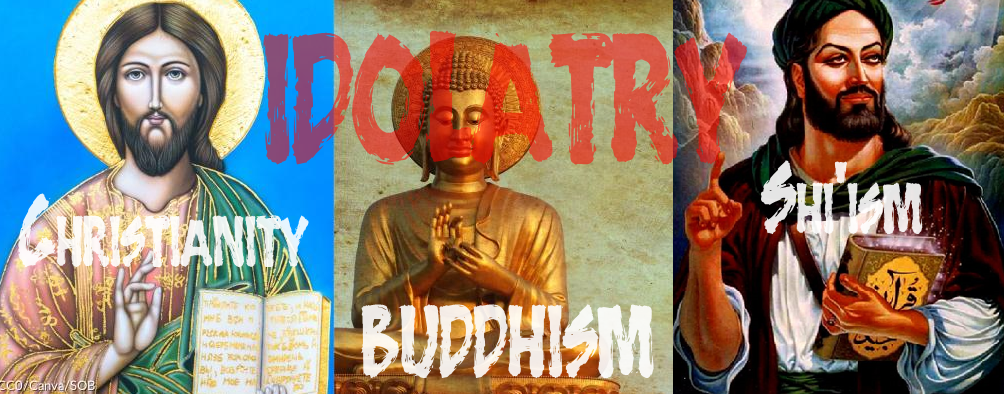 I have already written a piece detailing the blessed Islamic tradition of iconoclasm here. In this short treatise, I’d like to expand on one of the greatest idol-breakers and iconoclasts who ever walked the earth: none other than Prophet Ibrahim (Abraham), peace be upon him. This great monotheist obliterated and discarded idolatry without any sugarcoating or appeasement. He is the role model for every Muslim when it comes to lambasting idolatry.
I have already written a piece detailing the blessed Islamic tradition of iconoclasm here. In this short treatise, I’d like to expand on one of the greatest idol-breakers and iconoclasts who ever walked the earth: none other than Prophet Ibrahim (Abraham), peace be upon him. This great monotheist obliterated and discarded idolatry without any sugarcoating or appeasement. He is the role model for every Muslim when it comes to lambasting idolatry.
Tag Archives: Islam Is Superior
Not All Religions Are the Same – Penis, Vagina, and Trump Worship
أَعُوذُ بِاللهِ مِنَ الشَّيْطَانِ الرَّجِيمِ
I seek refuge with Allah from the accursed devil.
بِسْمِ اللَّهِ الرَّحْمَٰنِ الرَّحِيمِ
In the name of Allah, the Most Gracious, the Most Merciful.
يَـٰٓأَيُّهَا ٱلَّذِينَ ءَامَنُوٓا۟ إِنَّمَا ٱلْمُشْرِكُونَ نَجَسٌۭ
O you who believe! The idolaters/polytheists are nothing but filthy.
– The Noble Qur’an
Continue reading Not All Religions Are the Same – Penis, Vagina, and Trump Worship
Expert Confirms Next-of-Kin (Xwedodah) Marriages in Zoroastrian Iran
 Nora Elisabeth Mary Boyce (2 August 1920 – 4 April 2006) was a British scholar of Iranian languages and an authority on Zoroastrianism. Boyce was anything but a fanatic or ‘Islamist’ who wanted to bad name Zoroastrianism and Pre-Islamic Persia. A quote from Wikipedia shows that if anything she did her utmost to clarify many misconceptions about Zoroastrianism:
Nora Elisabeth Mary Boyce (2 August 1920 – 4 April 2006) was a British scholar of Iranian languages and an authority on Zoroastrianism. Boyce was anything but a fanatic or ‘Islamist’ who wanted to bad name Zoroastrianism and Pre-Islamic Persia. A quote from Wikipedia shows that if anything she did her utmost to clarify many misconceptions about Zoroastrianism:
In 1963–64, Boyce spent a research year among orthodox Zoroastrians of the 24 villages of Yazd, Iran. The results of her research there were formative to her understanding of Zoroastrianism and she discovered that much of the previously established scholarship on the ancient faith was terribly misguided. In 1975, Boyce presented the results of her research at her Ratanbai Katrak lecture series at Oxford University. In the same year she published the first volume of her magnum opus, The History of Zoroastrianism, which appeared in the monograph series Handbuch der Orientalistik (Leiden:Brill). Her Ratanbai Katrak lecture series were published in 1977 as A Persian Stronghold of Zoroastrianism.
However, even Boyce could not deny the disturbing reality of Zoroastrian (Majoosi) next-of-kin marriages in Pre-Islamic Iran.
Al-Hamdulillah for Umar ibn al-Khattab (may Allah be pleased with him) and his pious army of Sahabah who obliterated their incestuous Majoosi empire. Persian should be grateful to Umar ibn al-Khattab who freed them of the degeneracy of Zoro-Majoosim and brought them Tawhid.
In Sunni regions of Iran, people indeed acknowledge this favour. For instance, in Iranian Baluchistan, a Sunni stronghold where neither Iranian-Persian nationalism nor semi-Majoosi Shi’ism has any foothold, it is common for people to name their children Umar. They express their gratitude solely to Allah for sending Umar and his army to liberate them from the kufr and oppression of the Sassanian Zoroastrians.
‘Ayatollah’ Brujerdi’s Startling Admission: Shi’ism’s Decline in Iran
‘Ayatollah’ Javad Alavi Boroujerdi, the grandson of the ‘Grand Ayatollah’ Hossein Tabatabaei Boroujerdi, shares concerns about the future of the Shia clergy and Shi’ism. Likewise, individuals such as Abbas Abdi, who played a role in the U.S. Embassy hostage crisis before becoming a political dissenter, and Mohsen Hashemi, the son of the son of ‘Ayatollah’ Ali Akbar Hashemi Rafsanjani, express similar apprehensions. All three are troubled by the erosion of the foundations of the Shia faith in Iran.

𝗜𝗱𝗼𝗹𝗮𝘁𝗿𝘆 𝗼𝗻 𝘀𝘁𝗲𝗿𝗼𝗶𝗱𝘀 𝗶𝗻 𝗕𝘂𝗱𝗱𝗵𝗶𝘀𝗺 – The Evil of Idolatry
 In oh-so-ascetic Buddhism, the oh-so-humble and ascetic monks (often living in impoverished countries) insist on statues of their founding father (these idols have become a source of income for them, from which they fund their monasteries, much like Shia and Sufi shrines are a source of income for ‘pirs’ and ‘ayatollahs’).
In oh-so-ascetic Buddhism, the oh-so-humble and ascetic monks (often living in impoverished countries) insist on statues of their founding father (these idols have become a source of income for them, from which they fund their monasteries, much like Shia and Sufi shrines are a source of income for ‘pirs’ and ‘ayatollahs’).
Continue reading 𝗜𝗱𝗼𝗹𝗮𝘁𝗿𝘆 𝗼𝗻 𝘀𝘁𝗲𝗿𝗼𝗶𝗱𝘀 𝗶𝗻 𝗕𝘂𝗱𝗱𝗵𝗶𝘀𝗺 – The Evil of Idolatry


